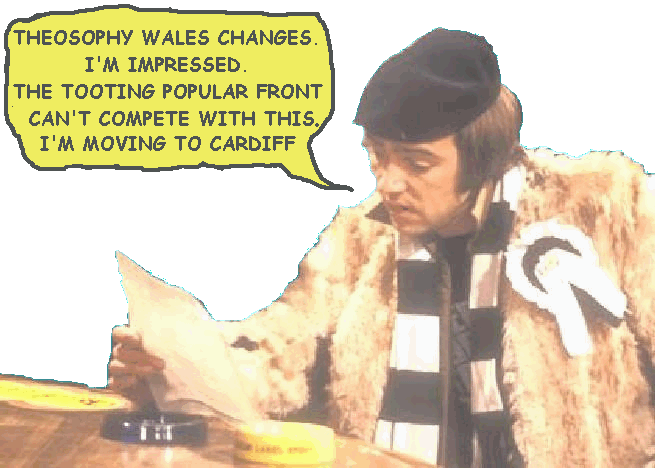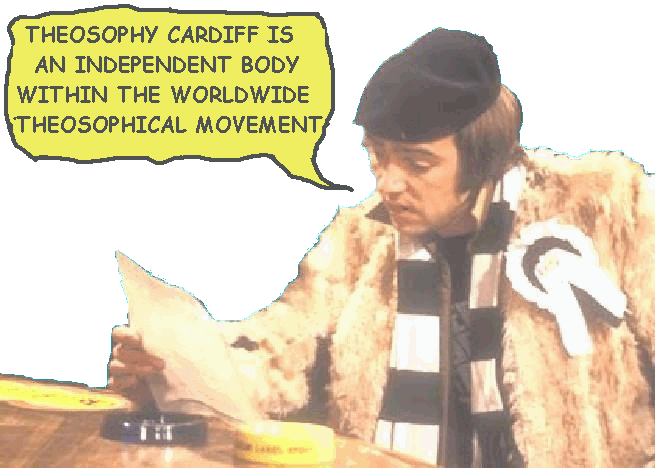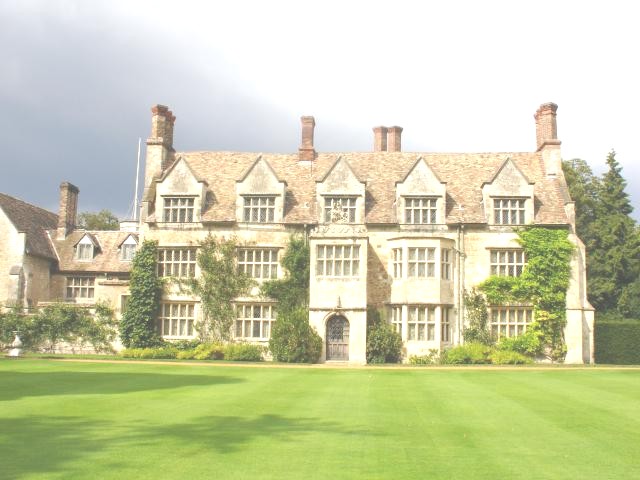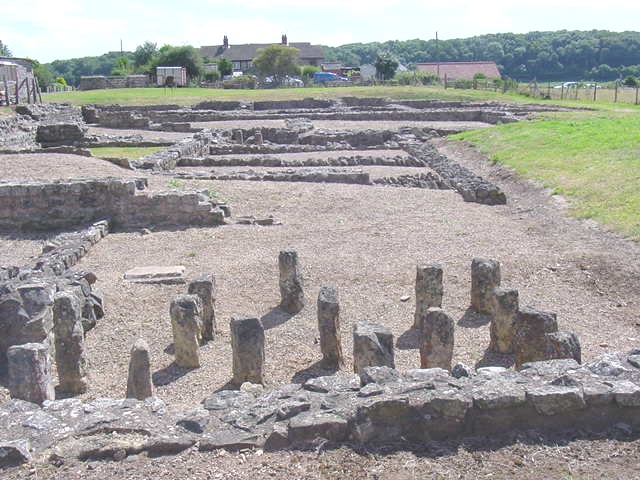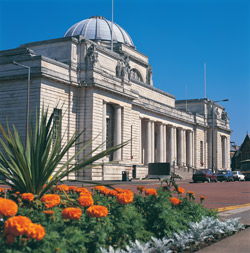BURN-UP
Theosophy Stuff from
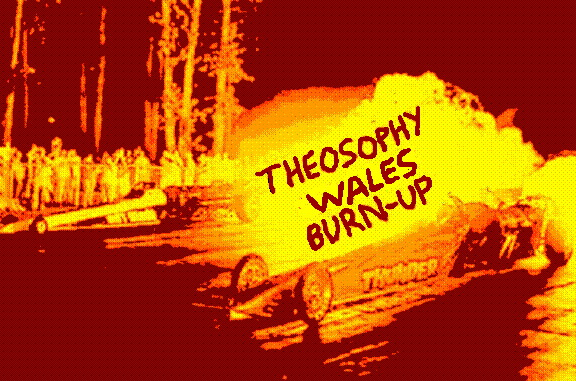
Theosophical
Society members arriving for a meeting.
(Actually,
some arrive by bike)
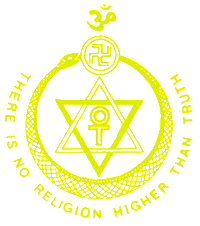
You can find
Theosophy Wales groups in
Bangor, Cardiff, Conwy & Swansea
Theosophy Wales
has no controlling body
and is made up of
independent groups
______________________________
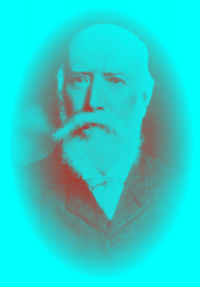
The Occult World
By
Alfred Percy Sinnett
Theosophy Wales
are pleased to present this
Tour de Force of esoteric writing.
The Occult World is an treatise on the
Occult and Occult Phenomena,
presented in readable
style, by an early giant of the Theosophical Movement.
Alfred Percy Sinnett and his wife
Patience were personally invited
to join the
Theosophical Society by the founder of modern Theosophy,
Helena Petrovna Blavatsky herself
Theosophists nowadays hesitate to use the
word “Occult” as it has
been kicked around,
adapted and reworked to suit many purposes
and contexts.A P Sinnett uses the word to describe the study
of a deeper
spiritual reality that extends beyond rigid rational
thinking and the
accepted boundaries of the physical sciences.
The Occult
World
By
A P Sinnett
Chapter 1
Occultism and its Adepts
1
The powers with which occultism invests its adepts include, to begin
with, a control over various forces in Nature which ordinary science knows
nothing about, and by means of which an adept can hold conversation with any
other adept, whatever intervals on the earth's surface may lie between them.
This psychological telegraphy is wholly independent of all mechanical
conditions or appliances whatever.[ See
Appendix B. ] And the
clairvoyant faculties of the adept are so perfect and complete that they amount
to a species of omniscience as regards mundane affairs. The body is the prison
of the soul for ordinary mortals. We can see merely what comes before its
windows ; we can take cognisance only of what is
brought within its bars. But the adept has found the key of his prison and can
emerge from it at pleasure. It is no longer a prison for him-merely a d
welling. In other words, the adept can project his soul out of his body to any
place he pleases with the rapidity of thought.
The whole edifice of occultism from basement to roof is so utterly
strange to ordinary conceptions that it is difficult to know how to begin an
explanation of its contents. How could one describe a calculating machine to an
audience unfamiliar with the simplest mechanical contrivances and knowing
nothing of arithmetic§ And the highly cultured classes of modern Europe, as regards
the achievements of occultism, are, in spite of the perfection of their
literary scholarship and the exquisite precision of their attainments in their
own departments of science, in the position as regards occultism of knowing
nothing about the A B C of the subject, nothing about the capacities of the
soul at all as distinguished from the capacities of body and soul combined. The
occultists for ages have devoted themselves to that study chiefly; they have
accomplished results in connexion with it which are
absolutely bewildering in their magnificence; but suddenly introduced to some
of these, the prosaic intelligence is staggered and feels in a world of miracle
and enchantment. On charts that show the stream of history, the nations all
intermingle more or less, except the Chinese, and that is shown coming down in
a single river without affluents and without branches
from out of the clouds of time. Suppose that civilized Europe had not come into
contact with the Chinese till lately, and suppose that the Chinamen, very much
brighter in intelligence than they really are, had developed some branch of
physical science to the point it actually has reached with us; suppose that
particular branch had been entirely neglected with us, the surprise we should
feel at taking up the Chinese discoveries in their refined development without
having gradually grown familiar with their small beginnings would be very
great.
Now this is exactly the situation as regards occult science. The
occultists have been a race apart from an earlier period than we can fathom-
not a separate race physically, not a uniform race physically at all, nor a
nation in any sense of the word, but a continuous association of men of the
highest intelligence linked together by a bond stronger than any other tie of
which mankind has experience, and carrying on with a perfect continuity of
purpose the studies and traditions and mysteries of self-development handed
down to them by their predecessors. All this time the stream of civilization,
on the foremost waves of which the culture of modern Europe is floating, has
been wholly and absolutely neglectful of the one study with which the
occultists have been solely engaged. What wonder that the two lines of
civilization have diverged so far apart that their forms are now entirely
unlike each other. It remains to be seen whether this attempt to reintroduce
the long-estranged cousins will be tolerated or treated as an impudent attempt
to pass off an impostor as a relation.
I have said that the occultist can project his soul from his body. As an
incidental discovery, it will be observed, he has thus ascertained beyond all
shadow of doubt that he really has got a soul. A comparison of myths has
sometimes been called the science of religion. If there can really be a science
of religion it must necessarily be occultism. On the surface, perhaps, it may
not be obvious that religious truth must necessarily open out more completely
to the soul as temporarily loosened from the body, than to the soul as taking cognisance of ideas through the medium of the physical
senses. But to ascend into a realm of immateriality, where cognition becomes a
process of pure perception while the intellectual faculties are in full play
and centred in the immaterial man, must manifestly be
conducive to an enlarged comprehension of religious truth.
I have just spoken of the" immaterial man " as distinguished
from the body of the physical senses ; but, so complex is the statement I have
to make, that I must no sooner induce the reader to tolerate the phrase than I
must reject it for the future as inaccurate. Occult philosophy has ascertained
that the inner ethereal self, which is the man as distinguished from his body,
is itself the envelope of something more ethereal still --is itself, in a subtle
sense of the term, material.
The majority of civilized people believe that man has a soul which will
somehow survive the dissolution of the body; but they have to confess that they
do not know very much about it. A good many of the most highly civilized,
have grave doubts on the subject, and some think that researches in physics
which have suggested the notion that even thought may be a mode of motion, tend
to establish the strong probability of the hypothesis that when the life of the
body is destroyed nothing else survives. Occult philosophy does not speculate
about the matter at all ; it knows the state of the facts.
St. Paul, who was an occultist, speaks of man as constituted of body,
soul, and spirit. The distinction is one that hardly fits in with the theory,
that when a man dies his soul is translated to heaven or hell for ever. What
then becomes of the spirit, and what is the spirit as different from the soul,
on the ordinary hypothesis. Orthodox thinkers work out each some theory on the
subject for himself. Either that the soul is the seat of the emotions and the
spirit of the intellectual faculties, or vice versa. No one can put such
conjectures on a solid foundation, not even on the basis of an alleged
revelation. But
The important point which occultism brings out is that the soul of man,
while something enormously subtler and more ethereal and more lasting than the
body, is itself a material reality. Not material as chemistry
understands matter, but as physical science en bloc might understand it
if the tentacle of each branch of science were to grow more sensitive and were
to work more in harmony.
It is no denial of the materiality of any hypothetical substance to say
that one cannot determine its atomic weight and its affinities. The ether that
transmits light is held to be material by anyone who holds it to exist at all,
but there is a gulf of difference between it and the thinnest of the gases. You
do not always approach a scientific truth from the same direction. You may
perceive some directly; you have to infer others indirectly; but these latter
may not on that account be the less certain. The materiality of ether is
inferable from the behaviour of light: the materiality of the soul may be
inferable from its subjection to forces. A mesmeric influence is a force
emanating from certain physical characteristics of the mesmerist. It impinges
on the soul of the subject at a distance and produces an effect perceptible to
him, demonstrable to others. Of course this is an illustration and no proof. I
must set forth as well as I am able--and that can but be very imperfectly-the
discoveries of occultism without at first attempting the establishment by proof
of each part of these discoveries. Further on, I shall be able to prove some
parts at any rate, and others will then be recognised
as indirectly established, too.
The soul is material, and inheres in the ordinarily more grossly
material body; and it is this condition of things which enables the occultist
to speak positively on the subject, for he can satisfy himself at one coup that
there is such a thing as a soul, and that it is material in its nature, by
dissociating it from the body under some conditions, and restoring it again.
The occultist can even do this sometimes with other souls; his primary
achievement, however, is to do so with his own.
When I say that the occultist knows he has a soul I refer to this
power. He knows it just as another man knows he has a great coat. He can put it
from him, and render it manifest as something separate from himself. But
remember that to him, when the separation is effected, he is the soul
and the thing put off is the body. And this is to attain nothing less than
absolute certainty about the great problem of survival after death. The adept does
not rely on faith, or on metaphysical speculation, in regard to the
possibilities of his existence apart from the body. He experiences such an
existence whenever he pleases, and although it may be allowed that the more art
of emancipating himself temporarily from the body would not necessarily inform
him concerning his ultimate destinies after that emancipation should be final
at death, it gives him, at all events, exact knowledge concerning the
conditions under which he will start on his journey in the next world. While
his body lives, his soul is, so to speak, a captive balloon (though with a very
long, elastic and imponderable cable). Captive ascents will not necessarily
tell him whether the balloon will float when at last the machinery below breaks
up, and he finds himself altogether adrift; but it is something to be an
aeronaut already, before the journey begins, and to know definitely, as I said
before, that there are such things as balloons, for certain emergencies, to
sail in.
There would be infinite grandeur in the faculty I have described alone,
supposing that were the end of adeptship : but
instead of being the end, it is more like the beginning. The seemingly magic
feats which the adepts in occultism have the power to perform, are accomplished,
I am given to understand, by means of familiarity with a force in nature which
is referred to in Sanskrit writings as akaz.
Western science has done much in discovering some of the properties and
powers of electricity. Occult science, ages before, had done much more in
discovering the properties and powers of akaz.
In " The Coming Race," the late Lord Bulwer Lytton, whose connexion with occultism appears to have been closer than
the world generally has yet realised, gives a
fantastic and imaginative account of the wonders achieved in the world to which
his hero penetrates, by means of Vril. In writing of Vril, Lord Lytton has clearly been poetising
akaz. "The Coming Race" is described
as a people entirely unlike adepts in many essential particulars--as a complete
nation, for one thing, of men and women all equally handling the powers, even
from childhood, which- or some of which among others not described- the adepts
have conquered.
This is a mere fairy-tale, founded on the achievements of occultism. But
no one who has made a study of the latter can fail to see, can fail to recognise with a conviction amounting to certainty, that
the author of "The Coming Race " must have been familiar with the
leading ideas of occultism, perhaps with a great deal more. The same evidence
is afforded by Lord Lytton's other novels of mystery, " Zanoni," and "The Strange Story." In "Zanoni," the sublime personage in the background, Mejnour, is intended plainly to be a great adept of Eastern
occultism, exactly like those of whom I have to speak. It is difficult to know
why in this case, where Lord Lytton has manifestly intended to adhere much more
closely to the real facts of occultism than in " The Coming Race," he
should have represented Mejnour as a solitary
survivor of the Rosicrucian fraternity.
The guardians of occult science are content to be a small body as
compared with the tremendous importance of the knowledge which they save from
perishing, but they have never allowed their numbers to diminish to the extent
of being in any danger of ceasing to exist as an organised
body on earth. It is difficult again to understand why Lord Lytton, having
learned so much as he certainly did, should have been content to use up his
information merely as an ornament of fiction, instead of giving it to the world
in a form which should claim more serious consideration.
At all events, prosaic people will argue to that effect; but it is not
impossible that Lord Lytton himself had become, through long study of the
subject, so permeated with the love of mystery which inheres in the occult mind
apparently, that he preferred to throw out his information in a veiled and
mystic shape, so that it would be intelligible to readers in sympathy with
himself, and would blow unnoticed past the commonplace understanding without
awakening the angry rejection which these pages, for example, if they are
destined to attract any notice at all, will assuredly encounter at the hands of
bigots in science, religion, and the great philosophy of the commonplace.
Akaz, be it then understood, is a force for
which we have no name, and in reference to which we have no experience to guide
us to a conception of its nature. One can on)y grasp at the idea required by
conceiving that it is as much more potent, subtle, and extraordinary an agent
than electricity, as electricity is superior in subtlety and variegated
efficiency to steam. It is through his acquaintance with the properties of this
force, that the adept can accomplish the physical phenomena, which I shall presently
be able to show are within his reach, besides others of far greater
magnificence.
2
Who are the adepts who handle the tremendous forces of which I speak ?
There is reason to believe that such adepts have existed in all historic ages,
and there are such adepts in
The conclusion has to be worked out from a mass of literary evidence,
and it will be enough to state it for the moment, pointing out the proper
channels of research in the matter afterwards. For the present let us consider
the position of the adepts as they now exist, or, to use the designation more
generally employed in
They constitute a Brotherhood, or Secret Association, which ramifies all over
the East, but the principal seat of which for the present I gather to be in
Never, I believe, in less than seven years from the time at which a
candidate for initiation is accepted as a probationer, is he ever admitted to
the very first of the ordeals, whatever they may be, which bar the way to the
earliest decrees of occultism, and there is no security for him that the seven
years may not be extended ad libitum.
He has no security that he will ever be admitted to any initiation
whatever. Nor is this appalling uncertainty, which would alone deter most
Europeans, however keen upon the subject intellectually, from attempting to
advance, themselves, into the domain of occultism, maintained from the mere
caprice of a despotic society, coquetting, so to speak, with the eagerness of
its wooers.
The trials through which the neophyte has to pass are no fantastic
mockeries, or mimicries of awful peril. Nor, do I take it, are they artificial
barriers set up by the masters of occultism, to try the nerve of their pupils,
as a riding-master might put up fences in his school.
It is inherent in the nature of the science that has to be explored,
that its revelations shall stagger the reason and try the most resolute
courage. It is in his own interest that the candidate's character and fixity of
purpose, and perhaps his physical and mental attributes, are tested and watched
with infinite care and patience in the first instance, before he is allowed to
take the final plunge into the sea of strange experiences through which he must
swim with the strength of his own right arm, or perish.
As to what may be the nature of the trials that await him during the
period of his development, it will be obvious that I can have no accurate
knowledge, and conjectures based on fragmentary revelations pictured up here
and there are not worth recording, but as for the nature of the life led by the
mere candidate for admission as a neophyte it will be equally plain that no
secret is involved.
The ultimate development of the adept requires amongst other things a
life of absolute physical purity, and the candidate must, from the beginning,
give practical evidence of his willingness to adopt this. He must, that is to
say, for all the years of his probation, be perfectly chaste, perfectly
abstemious, and indifferent to physical luxury of every sort. This regimen does
not involve any fantastic discipline or obtrusive asceticism, nor withdrawal
from the world. There would be nothing to prevent a gentleman in ordinary
society from being in some of the preliminary stages of training for occult
candidature without anybody about him being the wiser. For true occultism, the
sublime achievement of the real adept, is not attained through the loathsome
asceticism of the ordinary Indian fakir, the yogi of the woods and
wilds, whose dirt accumulates with his sanctity--of the fanatic who fastens
iron hooks into his flesh, or holds up an arm until it is withered. An
imperfect knowledge of some of the external facts of Indian occultism will
often lead to a misunderstanding on this point.
Yog Vidya is the Indian
name for occult science, and it is easy to learn a good deal more than is worth
learning about the practices of some misguided enthusiasts who cultivate some
of its inferior branches by means of mere physical exercises. Properly
speaking, this physical development is called Hatta
Yog, while the loftier sort, which is approached
by the discipline of the mind, and which leads to the high altitudes of
occultism, is called Raya yog. No person whom
a real occultist would ever think of as an adept, has acquired his powers by
means of the laborious and puerile exercises of the Hatta
yog. I do not mean to say that these inferior
exercises are altogether futile. They do invest the person who pursues them
with some abnormal faculties and powers. Many treatises have been written to
describe them, and many people who have lived in
I do not wish to fill these pages with tales of wonder that I have had
no means of sifting, or it would be easy to collect examples; but the point to
insist on here is that no story anyone can have heard or read which seems to
put an ignoble, or petty, or low-minded aspect on Indian yogeeism
can have any application to the ethereal yogeeism
which is called Raya yog, and which leads to
the awful heights of true adeptship.
______________________
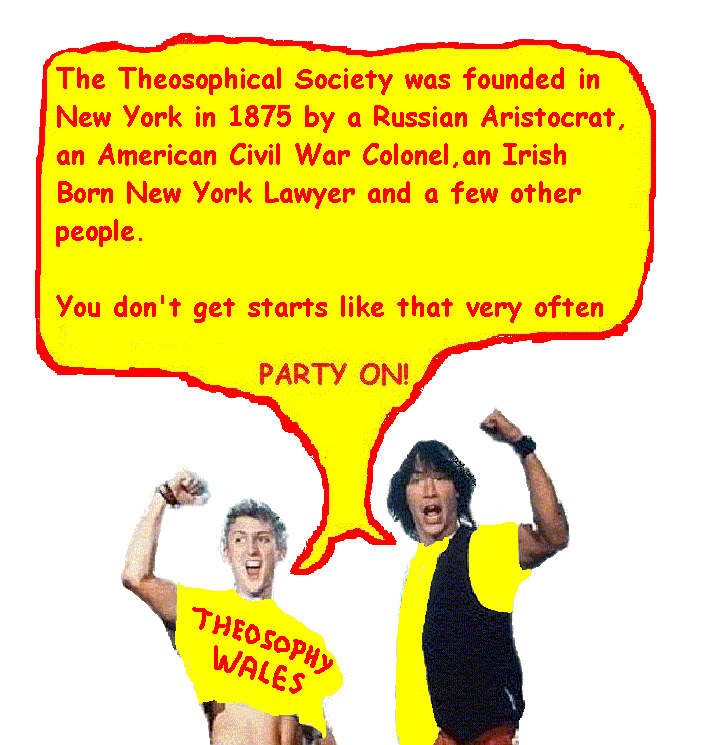
_____________________________
More
Theosophy Stuff
with
these links
Cardiff Theosophical Society meetings
are informal
and there’s always a
cup of tea afterwards
The Cardiff Theosophical Society Website
The National
Wales Theosophy Website
Bangor, Cardiff, Conwy
& Swansea
Theosophy
Wales Youtube Channel
Ten Benefits of Studying the Blavatskyan
Theosophical Teachings
Studying
the Blavatskyan Theosophical teachings offers numerous benefits that can greatly
enrich one's understanding of spirituality, philosophy, and the nature of
reality. Theosophy, as defined by the
writings of Helena Petrovna Blavatsky, has had a
profound impact on the spiritual and philosophical landscape of the modern
world. Blavatsky's teachings draw from a wide range of religious and
philosophical traditions, including Hinduism, Buddhism, and Western
esotericism, and present a comprehensive worldview that addresses fundamental
questions about existence, consciousness, and the cosmos.
Here
are ten benefits of studying the Blavatskyan Theosophical Teachings
1.
Exploration of Esoteric Wisdom
One
of the primary benefits of studying the Blavatskyan Theosophical teachings is
the opportunity to explore esoteric wisdom that is often not readily accessible
in mainstream religious or philosophical traditions. Blavatsky's writings delve
into the esoteric teachings of ancient cultures and mystery schools, shedding
light on profound spiritual truths that have been passed down through the ages.
By delving into these esoteric teachings, students of Theosophy can gain
insights into the nature of consciousness, the structure of the cosmos, and the
evolution of the soul or immortal self.
2.
Synthesis of Eastern and Western Philosophy
Blavatsky's
Theosophical teachings synthesize elements of Eastern and Western philosophy,
offering a comprehensive framework that integrates concepts from diverse
cultural and religious traditions. This synthesis provides students with a
broader perspective on philosophical and spiritual thought, allowing them to
see the underlying unity of seemingly disparate belief systems. By studying
Theosophy, individuals can gain a deeper appreciation for the universal
principles that underlie all wisdom traditions, fostering a sense of unity and
interconnectedness with the world's spiritual heritage.
3.
Understanding of Universal Brotherhood
Central
to Blavatsky's Theosophical teachings is the principle of universal
brotherhood, which emphasizes the essential unity of all beings and the
interconnectedness of life. By studying Theosophy, individuals can develop a
profound understanding of the interconnected nature of existence, recognizing
that all living beings are fundamentally linked and that compassion and empathy
are essential for the evolution of humanity. This understanding can lead to a
greater sense of empathy, kindness, and social responsibility, fostering a more
harmonious and compassionate society.
4.
Insight into the Nature of Reality
The
Blavatskyan Theosophical teachings offer profound insights into the nature of
reality, consciousness, and the unseen dimensions of existence. Through the
study of Theosophy, individuals can explore concepts such as the
multi-dimensional nature of the universe, the existence of subtle energy
realms, and the interconnectedness of the material and spiritual planes. This
exploration can lead to a deeper understanding of the nature of reality beyond
the limitations of the physical senses, opening up new vistas of perception and
understanding.
5.
Personal Spiritual Growth
Studying
the Theosophical teachings can be a transformative journey that facilitates
personal spiritual growth and self-discovery. Blavatsky's writings offer
practical guidance for inner development, including meditation practices,
ethical principles, and the cultivation of spiritual virtues. By applying these
teachings to their lives, individuals can experience profound personal
transformation, leading to greater self-awareness, inner peace, and a sense of
purpose and meaning.
6.
Ethical and Moral Guidance
The
Theosophical teachings provide a comprehensive ethical and moral framework that
can guide individuals in their personal and social interactions. Blavatsky
emphasizes the importance of ethical conduct, altruism, and the pursuit of
wisdom, offering practical guidance for leading a virtuous and meaningful life.
By studying Theosophy, individuals can gain clarity on moral issues, cultivate
a sense of ethical responsibility, and contribute to the greater good of
humanity.
7.
Appreciation of Comparative Religion
The
study of Theosophy encourages an appreciation of comparative religion and the
underlying unity of religious and spiritual traditions. Blavatsky's writings
explore the common threads that run through the world's religions, highlighting
universal spiritual principles that transcend cultural and historical
boundaries. By gaining a deeper understanding of comparative religion through
Theosophy, individuals can develop a more inclusive and pluralistic
perspective, fostering interfaith harmony and mutual respect.
8.
Intellectual Stimulation
The
Theosophical teachings offer a rich and intellectually stimulating framework
for exploring profound philosophical and metaphysical concepts. Blavatsky's writings
encompass a wide range of subjects, including cosmology, metaphysics, ancient
wisdom, and the evolution of consciousness, providing ample material for
intellectual inquiry and contemplation. By engaging with these teachings,
individuals can expand their intellectual horizons, develop critical thinking
skills, and gain a deeper understanding of the fundamental questions that have
intrigued philosophers and mystics throughout history.
9.
Healing and Reconciliation
The
Theosophical teachings offer insights into the nature of healing and
reconciliation, both on a personal and collective level. Blavatsky's writings
delve into the esoteric principles of healing, the nature of disease, and the
interconnectedness of mind, body, and spirit. By studying Theosophy,
individuals can gain a deeper understanding of holistic healing modalities, the
power of the mind in influencing health, and the potential for spiritual
transformation through the healing process. Furthermore, the Theosophical
emphasis on universal brotherhood and compassion can contribute to the
reconciliation of divisions and conflicts within society, fostering a more
harmonious and peaceful world.
10.
Contribution to Global Transformation
Finally,
studying the Blavatskyan Theosophical teachings can empower individuals to
contribute to the ongoing global transformation towards a more enlightened and
compassionate world. Blavatsky's vision of a spiritually awakened humanity,
working towards the betterment of all beings, inspires individuals to engage in
positive action and service to humanity. By embodying the principles of
Theosophy in their lives, individuals can become agents of positive change,
working towards the realization of a more just, peaceful, and sustainable
world.
In
summary, the study of the Blavatskyan Theosophical teachings offers a wide
range of benefits, ranging from personal spiritual growth to the potential for
global transformation. By delving into the esoteric wisdom, ethical principles,
and philosophical insights of Theosophy, individuals can expand their
understanding of the nature of reality, cultivate compassion and empathy, and
contribute to the evolution of humanity towards a more harmonious and
enlightened future. As the Theosophical teachings continue to inspire and guide
seekers of truth and wisdom, their profound impact on individuals and society
is likely to endure for generations to come.
If you run a Theosophy Group,
please feel free
to
use any of the material on this site
The Most Basic Theosophy
Website in the Universe
A quick overview of Theosophy
and the Theosophical Society
If you run a Theosophy Group you
can use this as an introductory handout.
Theosophy Cardiff’s Instant Guide
Theosophical
Movement in Wales
as it separates
into independent
groups that run do
their own show
One liners and quick explanations
H P Blavatsky is
usually the only
Theosophist that
most people have ever
heard of. Let’s put
that right
The Voice of the Silence Website
An Independent Theosophical Republic
Links to Free Online Theosophy
Study Resources; Courses, Writings,
The main criteria
for the inclusion of
links on this site is
that they have some
relationship (however
tenuous) to Theosophy
and are lightweight,
amusing or entertaining.
Topics include
Quantum Theory and Socks,
Dick Dastardly and Legendary Blues Singers.
A selection of
articles on Reincarnation
Provided in
response to the large
number of enquiries we
receive at
Cardiff
Theosophical Society on this subject
The Voice of the Silence Website
This is for everyone, you don’t have to live
in
Wales to make good use of this Website
No Aardvarks were harmed in the
The Theosophy Cardiff Guide to
The Theosophy Cardiff Guide to
The Theosophy Cardiff Guide to
Within the
British Isles, The Adyar Theosophical Society has
Groups in;
Bangor*Basingstoke*Billericay*Birmingham*Blackburn*Bolton*Bournemouth
Bradford*Bristol*Camberley*Cardiff*Chester*Conwy*Coventry*Dundee*Edinburgh
Folkstone*Glasgow*Grimsby*Inverness*Isle
of Man*Lancaster*Leeds*Leicester
Letchworth*London*Manchester*Merseyside*Middlesborough*Newcastle upon Tyne
North
Devon*Northampton*Northern Ireland*Norwich*Nottingham
Perth*Republic of Ireland*Sidmouth*Southport*Sussex*Swansea*Torbay
Tunbridge Wells*Wallasey*Warrington*Wembley*Winchester*Worthing
The Spiritual Home of Urban Theosophy
The Earth Base for Evolutionary Theosophy
_____________________
Concerns about
the fate of the wildlife as
Tekels Park is to
be Sold to a Developer
Concerns are
raised about the fate of the wildlife as
The Spiritual
Retreat, Tekels Park in Camberley,
Surrey, England
is to be sold to a developer.
Tekels Park is a
50 acre woodland park, purchased
for the Adyar
Theosophical Society in England in 1929.
In addition to
concern about the park, many are
worried about the
future of the Tekels Park Deer
as they are not a
protected species.
Anyone planning a
“Spiritual” stay at the
Tekels Park Guest
House should be aware of the sale.
____________________
A B C D EFG H IJ KL M N OP QR S T UV WXYZ
Complete Theosophical Glossary in Plain Text Format
1.22MB
Quick Explanations with Links to More Detailed Info
What is Theosophy
? Theosophy Defined (More Detail)
Three Fundamental Propositions Key Concepts of Theosophy
Cosmogenesis Anthropogenesis Root Races
Ascended Masters After Death States
The Seven Principles of Man Karma
Reincarnation Helena Petrovna Blavatsky
Colonel Henry Steel Olcott William Quan Judge
The Start of the Theosophical
Society
History of the Theosophical
Society
Theosophical Society Presidents
History of the Theosophical
Society in Wales
The Three Objectives of the
Theosophical Society
Explanation of the Theosophical
Society Emblem
The Theosophical Order of
Service (TOS)
Glossaries of Theosophical Terms
by
Annie Besant
THE BUDDHIC AND
NIRVANIC PLANES
MAN'S ASCENT BUILDING A
KOSMOS
______________________
Annie Besant Visits Cardiff 1924
An Outstanding
Introduction to Theosophy
By a student of
Katherine Tingley
Elementary Theosophy Who is the Man? Body and Soul
Body, Soul and Spirit Reincarnation Karma
What Theosophy Is From the Absolute to Man
The Formation of a Solar System The Evolution of Life
The Constitution of Man After Death Reincarnation
The Purpose of Life The Planetary Chains
The Result of Theosophical Study
Reincarnation
This guide has been included in response
to the number of enquiries we receive on
this
subject at Cardiff
Theosophical Society
From A Textbook
of Theosophy By C W Leadbeater
How We Remember our Past Lives
Life after Death & Reincarnation
The Slaughter of the
a great demand by the public for lectures
on Reincarnation
Quotes from the Writings of
Helena Petrovna Blavatsky
The Secret Doctrine , Volume 2, Page 100
It is only by the attractive force of the contrasts
that the two opposites — Spirit and Matter — can be cemented together on Earth,
and, smelted in the fire of
self-conscious experience and suffering, find themselves wedded in Eternity.
The Secret Doctrine , Volume 2, Page 108
It is the motive, and the motive alone, which makes
any exercise of power become black, malignant, or white, beneficent Magic. It is
impossible to employ spiritual forces if there is the slightest tinge of
selfishness remaining in the operator .... The powers
and forces of animal nature can equally be used by the selfish and revengeful,
as by the unselfish and the all-forgiving; the powers and forces of spirit lend
themselves only to the perfectly pure in heart — and this is Divine Magic.
Isis Unveiled, Volume 1, Page 36
The Secret Doctrine , Volume 3, Page 14
Even ignorance is better than Head-learning
with no Soul-wisdom to illuminate and guide it.
The Voice of
the Silence, Page 43
Annotation - The Path, May, 1888
The Secret Doctrine , Proem [Volume 1], Page 35
Isis Unveiled, Volume 1, Page 210
The Secret Doctrine , Volume 1, Page 134
incarnation of his God; and when the sense of personal responsibility
will be so
Isis Unveiled,
Volume 2, Page 374
It is the
motive, and the motive alone, which makes any exercise of power become
The Secret Doctrine , Volume 2, Page 498
Isis Unveiled, Volume 1, Page 36
From strength to
strength, from the beauty and perfection of one plane to the
greater beauty and perfection of another, with accessions of new
glory, of fresh
knowledge and power in each cycle, such is the destiny of every
Ego, which thus
becomes its own saviour in each world
and incarnation.
The Key to
Theosophy, Page 105
The Secret Doctrine , Volume 1, Page 69
The mind
receives indelible impressions even from chance acquaintance or persons
Isis Unveiled,
Volume 1, Page 311
The Key to Theosophy, Page 228
An Outline of Theosophy
Charles Webster Leadbeater
Theosophy - What it is How is it Known?
The
Method of Observation General
Principles
The Three Great Truths Advantage
Gained from this Knowledge
The Deity
The Divine Scheme The Constitution of Man
The True Man
Reincarnation The Wider Outlook
Death Man’s Past and
Future Cause and Effect
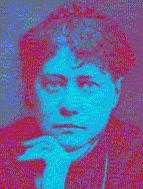
Helena Petrovna Blavatsky
1831 – 1891
The Founder of Modern Theosophy
Index of Articles by
By
H P Blavatsky
Is the Desire to Live Selfish?
Ancient Magic in Modern Science
Precepts Compiled by H P Blavatsky
Obras Por H P
Blavatsky
En Espanol
Articles about the Life of H P Blavatsky
Try these if you are looking for a local
Theosophy Group or Centre
UK Listing of Theosophical Groups
Please tell us about your UK Theosophy Group
___________________
into categories and
presented according to relevance of website.
Web Directory
- Add Link - Submit Article - Online Store - Forum
______________________

General pages about
Wales, Welsh History
and The History of
Theosophy in Wales
Wales is a
Principality within the United Kingdom and has an eastern
border with England.
The land area is just over 8,000 square miles.
Snowdon in North Wales is the highest mountain at 3,650 feet.
The coastline is
almost 750 miles long. The population of Wales
as at the 2001 census is 2,946,200.
________________
Bangor Conwy & Swansea Lodges are members
of the Welsh
Regional Association (Formed 1993).
Theosophy Cardiff
separated from the Welsh Regional
Association in
March 2008 and became an independent
body within the Theosophical Movement in March 2010
High Drama & Worldwide Confusion
as Theosophy
Cardiff Separates from the
Welsh Regional Association (formed 1993)
Theosophy Cardiff Cancels its Affiliation
to the Adyar Based Theosophical Society
Cardiff
Theosophical Society in Wales
Cardiff, Wales, UK. CF24 – 1DL
_________________
Wales Picture Gallery
The Great Orme
llandudno Promenade
Great Orme Tramway
New Radnor
Blaenavon Ironworks
Llandrindod Wells
Cardiff
Theosophical Society in Wales
Cardiff, Wales, UK. CF24 – 1DL
Presteign Railway
Caerwent Roman Ruins
Denbigh
Nefyn
Penisarwaen
Cardiff
Theosophical Society in Wales
Cardiff, Wales, UK. CF24 – 1DL

